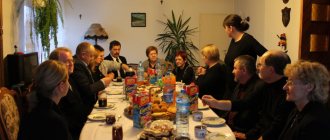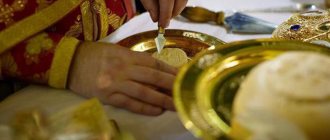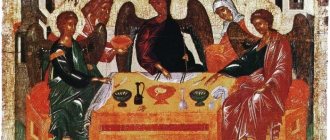A wake after a funeral: rules, when to hold it, how to count the days after death, the essence of the rite of remembrance.
Days of commemoration after death
- According to Orthodox canons - on the day of the funeral, on the 9th and 40th days and 1 year after death.
- You can remember the deceased with a kind word on any other day when the family gathers. Without clinking glasses and observing the rules and etiquette of condolences.
From what date should we count 9 and 40 days after death? You need to count from the date of death , not the funeral. If a person died before noon, then a funeral service is held on the eighth day. It is important that no more than 9 or 40 days from the moment of death.
The essence of funerals in Orthodox Christianity
Funerals help the soul ascend to heaven. The essence of the ritual of remembrance, all the words and prayers are a petition to God for the deceased before passing a sentence.
Immediately after death, a person’s soul is without shelter.
- Until the third day, it is in the habitats of the deceased during life.
- Then the soul is called to Heaven to worship the Lord God. For six days she gets acquainted with the lives of the Saints in the heavenly abode (in paradise).
- On the ninth day, the soul goes to hell, where for thirty days it is horrified by the suffering and torment of sinners. On the fortieth day, the soul is called to the judgment of the Lord, its posthumous fate is decided.
For 40 days, relatives and friends pray for the deceased, visit churches, order services for the repose of the servant of God, distribute alms, and on days 9 and 40 they hold a wake - a mandatory farewell ritual.
Funeral kutia recipe
Ingredients:
- Rice - 1 glass
- Raisins - 1 glass
- Honey - 100 g
- Sugar - 1 tablespoon
Preparation:
- Boil a glass of rice in salted water in a 1:1 ratio until tender. (There is a prejudice that water for rice cannot be salted, because kutya is not made for pleasure. These are echoes of the past, when salt was expensive and was considered a luxury for peasants. Today, clergy do not forbid salting kutya)
- Place the finished rice in a sieve and rinse under running water.
- Place the washed rice in a deep bowl. Add 100 g honey, 1 tablespoon sugar. Mix.
- Soak a glass of seedless raisins or rinse with boiling water. Add to rice. Mix everything. A church candle is inserted into the middle of the finished dish and blessed in the temple or sprinkled with holy water.
Funeral dates
Funeral service on the day of the funeral
The first wake takes place on the day of the funeral , and according to Orthodox tradition this is the third day after death . On this day, everyone who came to see off the deceased on his last journey is present at the wake. According to custom, they take place in the house of the deceased. But today, more and more often, funeral services are entrusted to a funeral service employee in a funeral hall or in a funeral café.
On the 9th day after death
The second wake is held on the 9th day after death, when only the closest people . It is not even necessary to set the table; It is important that there is kutia consecrated in the church. On this day, it would be correct to visit the cemetery, clean up the grave and pray for the deceased. In a narrow circle of best friends and closest relatives, you can discuss how to organize more crowded commemorations on the 40th day, who will send out invitations to the event .
Now is the time to order obituaries (pages of remembrance) from friends and family, as well as mourning cards for the rite of remembrance.
40th day or fortieth day
The third commemoration is the forties. On this day, according to the Orthodox faith, the fate of the soul of the deceased is decided at the Lord's court, so on fortieth day it is customary to gather, as on the day of the funeral, in a wider group of friends, relatives and colleagues of the deceased .
It is necessary to remember the deceased with words of sorrow , memorial speeches, epitaphs and pray for the repose of the soul. You should visit the grave, bless the kutya and, if possible, order a service in the church.
On the anniversary of death
The next days of remembrance will be the anniversary of death, birthday and name day . The Orthodox canon does not prescribe compulsory grave visits these days. It depends on the capabilities of loved ones. But Parents' Saturday for Christians is the day when a visit to the cemetery is considered a duty to one's ancestors .
In other religions, the ritual of commemoration is organized differently. For example, Muslim funerals are usually held on the day of the funeral, and then on the seventh and fortieth days after death.
The morning after the funeral
It is considered obligatory to return to the cemetery on this day and bring the deceased his last breakfast in order to demonstrate care during the transition of his soul to another world. Relatives who come can also eat food at the grave and must leave food supplies in the cemetery. It is prohibited to take dishes, towels and other items from the graveyard on this day.
Products of plant origin and animal food are brought to the cemetery, inviting not only the relatives and friends of the deceased to share the meal, but also the poor or people in need of help.
Sometimes relatives of the deceased order funeral flowers to lay at the grave.
Holding a wake
Frankly, the Orthodox canon comes into conflict with the established traditions of commemorations from the times of the USSR, the 90s, and the echoes of paganism ingrained among the people. to place a glass of vodka, covered with a piece of black bread, in the unoccupied place of the deceased at the table . The closest relatives of the deceased are seated near this place, and the other 3 are seated at their convenience. If the event is crowded, then the host should take care of the seating arrangements and offer guests reserved seats.
When commemorating the deceased, it is customary to gather at a modest and regulated table, and the Russian Orthodox Church does not accept alcohol at funerals.
A candle in front of the portrait of the deceased will also be a deviation from church rules - they are placed only in front of the face of saints. It would be correct to buy an icon of the patron saint of the deceased and light a candle in front of it, and do not obscure the photograph of the deceased with anything.
The clothes are neat, formal , and in discreet colors. Behavior must correspond to the occasion: modesty, delicacy, moderation in everything.
Lenten commemoration: funeral table menu
Ideally, according to Orthodox canons, dishes for a funeral should be lenten, and the food of the funeral meal should be blessed in the church. If these rules are difficult for you to follow, you can at least prepare several traditional Orthodox funeral dishes.
- Firstly, this is kutia - a sweet, crumbly cereal porridge made from rice or millet with raisins, seasoned with honey. Then - pancakes without filling and jelly . Kutia is traditionally served on the table first and is offered, first of all, to the closest relatives of the deceased.
- In addition, it is appropriate to prepare simple and classic dishes for a funeral service - pies with different fillings, fresh vegetables, boiled or baked potatoes, hard-boiled eggs.
The funeral table does not involve culinary delights. The remains of the treat are traditionally divided among the diverging guests.
Read more: “Funeral Meal”
Search for cafes for funeral services , restaurants with banquet halls for funeral meals and kitchens with funeral packages delivered to your home.
Funeral menu
The main dish at Russian funerals is kutia (other names: kanun, kolivo, sochivo). This is a sweet porridge made from wheat, rice or barley with the addition of dried fruits and nuts. Cereal grains symbolize the rebirth of life: a grain sown in the ground “dies” and then “reborn”, germinating and sprouting. The dish is also involved in the funeral ceremony. Kutya has its roots in the pagan cult of the ancestors of the Eastern Slavs, but is firmly entrenched in the Orthodox tradition. It is also prepared on Christmas Eve and Epiphany.
Lenten pancakes are served next. They also have deep pagan roots; the ancient Slavs used them in funeral rites. Only later did pancakes become associated with the Sun and the Maslenitsa holiday. Russian pancakes are distinguished by their dough. Usually this is yeast dough, less often choux pastry.
At the end, jelly with honey is served at the funeral table.
The funeral table can be complemented by other dishes. Orthodox priests do not allow alcohol to be served.
What to say at a wake
The head of the family traditionally receives the first word at the wake . In the future, the responsibility to monitor the general conversation and gently guide it rests with one of the relatives, but still not with the closest relative, whose grief is still perceived very acutely. A person who knew the deceased well and who is capable of running the table .
The usual norms of feasting do not apply to funerals. A pause in a funeral speech due to a surge of grief should not be covered with empty remarks, especially on an abstract topic. Silence at a wake is not only normal, but also correct : in silence, everyone remembers the deceased and feels more fully their connection with him.
Funeral speech at a wake
When you decide to speak up , stand up and briefly tell us what you remember about the deceased. There is no need to list the entire list of advantages, but it is better to clearly outline some interesting fact. It would be good to remember some case when the deceased helped you personally. Tell us about him, but avoid mentioning any of the ceremony guests.
Many people feel more confident when they rehearse their speech in advance . It should not be too drawn out, because everyone can speak at the wake . Let the mosaic of memories be made up of small but vivid fragments of the life and good deeds of the deceased.
Condolences , like any sincere expression of feelings, are not easy for some. You should not include deeply personal words in a speech that you will deliver publicly. It is natural and correct, when expressing condolences, to offer all possible help, and in such a statement made in public there is always a tinge of vanity.
Read more: “What they say at wakes”
Funerals and occult safety
The holding of a wake, like a funeral, is strictly regulated by church norms. However, these processes are invariably associated with a number of signs. Their presence is caused by fear of death, and many of them were transformed from pagan traditions.
The ancient Slavs, saying goodbye to the deceased, believed that at that moment they were confronting the world of the dead (Navi). For this purpose, our ancestors lit a funeral bonfire that could drive out evil spirits. Today no one burns bonfires at wakes, but it is still recommended to follow some rules of occult safety.
So, after returning from the cemetery, you need to wash your face and hands with water, and only then start eating. In ancient times, it was believed that water helps drive out evil spirits, just like fire.
During the funeral dinner, knives and forks are not used. Most likely, this tradition arose in ancient times, since the Slavs did not immediately accept forks in everyday use, believing that it resembled the horns of the devil.
Today, such a ban is explained as follows: negative energy can flow along the sharp edges of cutlery, accumulating against the participants of the funeral. But it seems more likely that the ban on the use of sharp instruments is purely for safety reasons, so that no one can get hurt on a day of mourning.
At a wake, it is also prohibited to eat or drink food intended for the deceased: a piece of bread and a shot of vodka. Traditionally, the glass is left in the house of the deceased until 40 days have passed from the date of death. After this, the glass is filled with vodka again and, together with the bread, it is left at the grave of the deceased.
At the wake on this day, it is strictly forbidden to discuss property issues and divide inheritance. The fact is that, according to religious norms, the soul of the deceased is still on earth, so such talk can offend it.
Before leaving home after the wake is over, you are allowed to take some baked goods and sweets with you. But you shouldn’t take the deceased’s belongings or just objects from his home, including dishes.
Third day after death:
After the last shovel of earth has been thrown, wreaths, flowers and photos of the deceased are placed on the grave. A wooden cross is placed on the grave, then it can be replaced with a monument or slab.
You can remember the deceased directly at the grave. The workers who helped bury the grave should also be treated to ritual dishes. Meals and treats are a form of alms that we donate to other people. And the function of this tradition is only to make the person who treats someone feel peace and remember the deceased with a kind word. For this reason, a meal without prayer and to maintain form will not bring benefit to the person who has left this world.
Beverages
The Orthodox faith does not welcome alcohol at a funeral meal. Prepare 1-2 drinks from berries or fruits. It is customary to cook jelly at a wake. You can make fruit juice or compote.
| Interesting! In the old days, a drink brewed from dried fruits, berries or fruits was called uvar or uzvar. The name is derived from the verb boil, boil. |
The following ingredients are required for the orange juice recipe:
- oranges – 400 g or 3 pcs.;
- granulated sugar – 215 g or 1 tbsp.;
- vanillin – 25 g or 1 tbsp. l.
Wash and peel the oranges, which you will set aside separately. Extract the juice from peeled oranges using a juicer. Grind the orange peel, place in a saucepan, add 1 glass of water, and bring to a boil. Add granulated sugar. Pour the previously set aside zest into a saucepan, add 100 ml of water and bring to a boil. Add sugar, stirring, and bring to a boil. Add vanilla sugar. Pour the squeezed orange juice into the pan. Add water and boil the drink. Strain through a sieve and cool the finished fruit drink.
For regular funeral jelly you will need the following ingredients:
- fruit or berry juice – 3 l;
- granulated sugar - to taste;
- potato starch – 100 g
Pour the juice into a 4-quart saucepan and bring to a boil. Pour starch into a cup, add warm water, stir evenly. Pour the starch solution into the juice. Bring the jelly to a boil, turn off the heat, and cool after pouring into glasses.
Funeral service - what to bring to church
When a person orders a memorial service at a church, he always brings food there. They are alms in honor of the deceased.
You can bring to church:
- flour and bakery and confectionery products;
- all kinds of cereals;
- fruits and vegetables;
- eggs;
- wine;
- sugar;
- vegetable oil.
Under no circumstances should you carry meat products. Also, all brought products must not be spoiled.
Remember: everything brought to the temple is a gift to God. The obligatory dish at a funeral service is kutia - boiled wheat with honey. The grain symbolizes growth and new life, and the honey makes it sweet.
Now wheat is often replaced with rice, and instead of honey they use raisins, laying them out in the shape of a Cross. After the requiem, the priest blesses the kutya and other offerings, and then they are distributed to everyone who came for the memorial, either at the cemetery or at home. Usually it is customary to remember the dead with something sweet.
Menu for home table
Since the times of Rus', traditional dishes have been served at funerals, such as kanun (fullness), kutya, jelly and pancakes.
They try to make the funeral table varied and richly set. As a rule, hot and cold meat (and fish) dishes are served. Pies are a common dish.
Reference! It is highly desirable to have an even number of dishes.
On the first
is perfect for a hot first course .
Preparation:
- To prepare it you will need meat broth (you can have it on the bone).
- When the meat is cooked, you should start frying the vegetables.
- Add finely chopped onion to a heated frying pan with sunflower oil.
- While it is frying, you need to cut the carrots and beets into cubes. Next, we also add these vegetables to the frying pan.
- While our vegetables are fried, we also cut the potatoes into cubes and add them to the broth.
- While the potatoes are cooking, add our vegetables from the frying pan to the broth.
- Next, cut the cabbage, tomatoes, and sweet peppers into cubes.
- Add the remaining ingredients to the broth.
- Additionally season our borscht with black pepper, add bay leaf and garlic to taste.
- A little vinegar and sugar won't hurt.
Hot dish
First prepare the minced meat. Next, grate the onion, garlic and mix the ingredients in one bowl along with the eggs, salt and pepper. Then knead until smooth.
Place our formed cutlets . Fry them on both sides. Next, pour a little oil into the pan and add the cutlets there. Fill half the layer of cutlets with water and simmer until evaporated.
For a snack
Beetroot and garlic salad is quite easy to prepare:
- We pre-wash the beets, but do not peel them. Wrap in foil and bake in the oven at a temperature of about 180 degrees. Baking time - from 60 to 80 minutes (this depends on the size of the vegetable). You can also boil it.
- Next, grate the beets, garlic and cheese.
- Add mayonnaise, salt and spices to taste to the ingredients.
- Chopped nuts or raisins are perfect for this salad.
- All that remains is to mix the salad and serve it to the table.
Dessert
To prepare puff pastries , we need puff pastry and filling (it can be apples, cottage cheese, bananas, and so on).
What role does this action play?
The opinions that in this way people seem to “feed” their loved ones in the next world with the food they loved during life, or that it is like a payment-donation to the Lord for a place in heaven for the deceased, are erroneous. The most important thing that is important for the deceased is your prayer from a pure heart. It happens that the deceased lived his life unworthily, could have committed sins, etc. Then the Orthodox Church advises relatives to pray for forgiveness of his sins. And the products brought are alms from yourself, not with a specific purpose “to someone for something,” but as a sign of your good and pure intentions, for the common good.
Don’t forget to also distribute alms to those begging at the temple with a request to pray for a deceased person close to you. Remember that only the sincerity and purity of your motives will enable your prayers for the deceased to be heard.
Days and holidays when it is customary to come to the grave
Arriving at the grave, it is customary to pray in your own words for the deceased or to perform a litiya - a short rite of requiem. You can read Psalm 91 and the Lord's Prayer. It is important not only to correct and renew the monument and fence, plant flowers and small trees, but also to remember a loved one with kind words. By these actions, the living seem to be caring for the soul of the deceased and reminding themselves of their own connection with eternity.
Memorial Days:
- birthday of the deceased;
- day of death;
- Day Angel.











